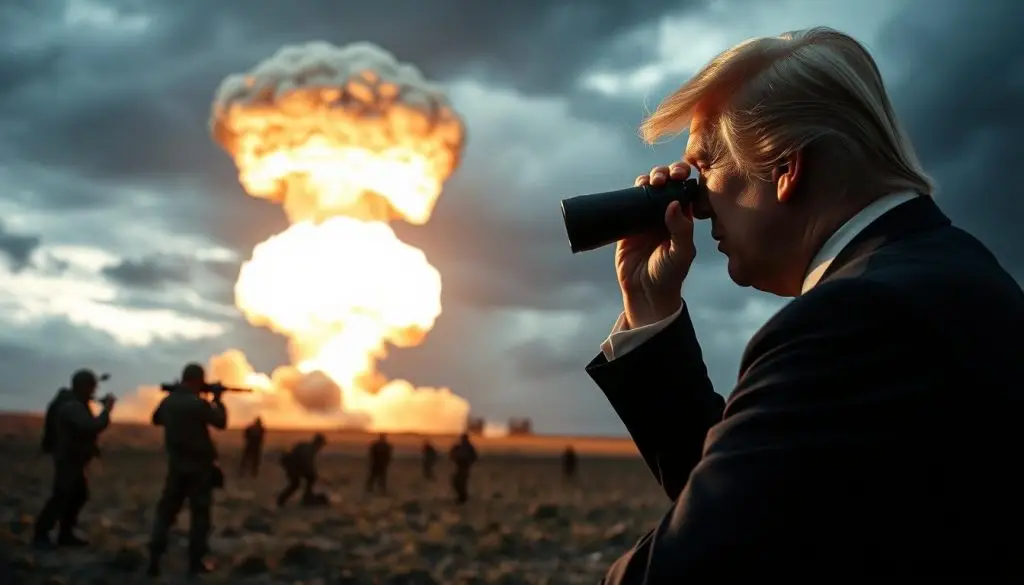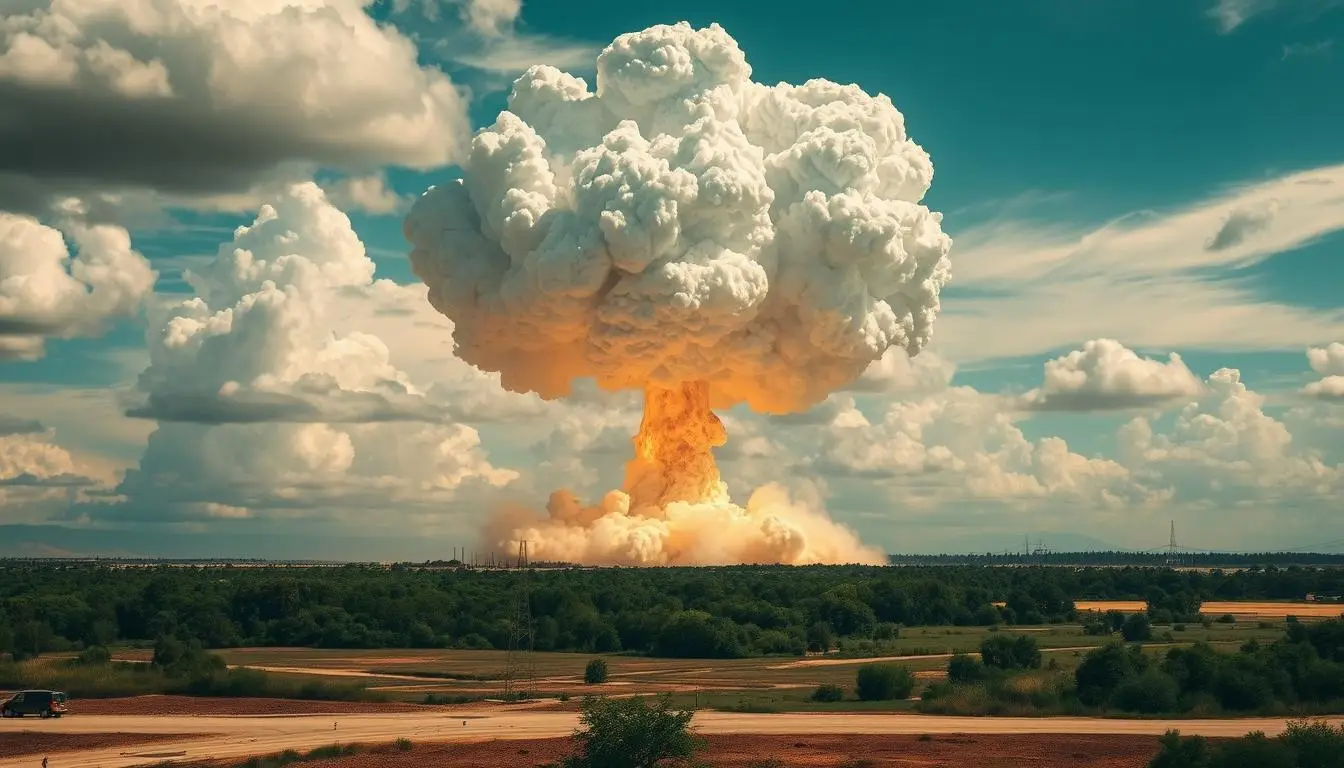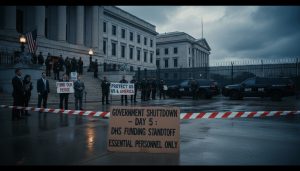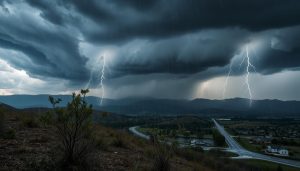Trump’s Nuclear Weapons Tests: What He Won’t Clarify.
Explore the controversy surrounding Trump’s Nuclear Weapons Tests and what remains unexplained about US nuclear policy and global security.

Trump's Nuclear Weapons Tests
Trump’s Nuclear Weapons Tests: President Donald Trump raised a big question: will the U.S. start underground nuclear tests again? He said, “You’ll find out very soon,” and mentioned, “We’re going to do some testing.” This sparked debate on his power to test nuclear weapons and its impact on global security.
In Washington, his words caused confusion and debate. He seemed to mix up missile tests with actual nuclear blasts. The U.S. has not tested nuclear weapons underground for 30 years. A detailed report says it could take months to start testing again at Nevada, as seen in this recent coverage.
Abroad, Moscow warned that a U.S. test could lead to a response. Russia and China have not tested nuclear weapons in years. Trump’s words were seen as a strategic move, raising the stakes for U.S. nuclear policy.
For voters and allies, the big question is: is this a real policy change or just a test? As the story unfolds, we will see how it affects deterrence and stability. The world waits for Trump to clarify his nuclear plans, amidst a growing rivalry, as seen in this political feud overview.
Trump’s Nuclear Weapons Tests Key Takeaways
- Trump hinted at “testing” but did not confirm underground nuclear detonations.
- The United States has not detonated a nuclear warhead in 30 years, though it tests missile delivery systems.
- Resuming tests would involve complex steps and months of preparation at federal sites.
- Russia and China highlight their own records while warning about escalation risks.
- The CTBT remains unsigned by the Senate, shaping U.S. nuclear policy choices.
- Ambiguity complicates news analysis and raises questions about presidential authority in nuclear testing.
Breaking Context: Ambiguous Signals on Underground Nuclear Detonation Tests
Washington signals suggest movement, but the path is unclear. The debate over Trump’s nuclear weapons tests raises questions. These include atomic testing, nuclear deterrence, and the limits of presidential authority in nuclear testing under arms control agreements.
What Trump Said Aboard Air Force One
While flying to Florida, Trump told reporters, “We’re going to do some testing,” then added, “You’ll find out very soon.” He said the U.S. should match other nations’ testing. This framing puts atomic testing in a competitive light, tied to nuclear deterrence and presidential authority.
The U.S. hasn’t detonated a nuclear device in 30 years, with the last underground shots in Nevada. Russia’s last tests were in 1990, and China hasn’t tested in decades but is expanding its arsenal. These facts influence how arms control agreements are viewed on Capitol Hill and worldwide.
“You’ll find out very soon”: Strategic Ambiguity or Policy Shift?
The phrasing left room for interpretation. Some thought it might be underground detonations; others thought it was routine missile trials. Senior officers declined to clarify, showing uncertainty even within the chain of command. Such ambiguity can be a tool in nuclear deterrence but also tests public trust and arms control agreements.
For background on timelines and treaty context, see this report on U.S. nuclear testing, which notes the role of the Nuclear Test Ban Treaty and recent Russian moves.
Pentagon Posture: Defense Secretary Pete Hegseth’s Remarks on “Resuming Testing”
Defense Secretary Pete Hegseth suggested that “resuming testing” could support a credible posture. He linked it to nuclear deterrence and readiness. He said the Pentagon would work with the Energy Department, which manages the stockpile, implying it could include warhead-related activities.
His words hinted at evaluating warheads, not just flight checks, while avoiding specifics. This stance navigates between presidential authority in nuclear testing and the constraints of arms control agreements.
Missile Testing vs. Warhead Detonation: Clarifying the Distinction
The U.S. conducts frequent missile flight tests without nuclear explosions. Warhead detonation is different, breaking a decades-long pause and raising treaty and norm questions. The Nuclear Test Ban Treaty, though not ratified by the U.S., sets a global expectation against explosive tests.
Russia has warned it could mirror any U.S. move, while China’s buildup complicates the picture. Trump’s nuclear weapons tests symbolize a larger dispute over deterrence, verification, and the durability of arms control agreements. Analysts debate how strategic messaging can shape perceptions of resolve without explosive testing.
Key takeaway for readers: words about testing can move markets, alarm allies, and shape doctrine long before any switch is flipped at a test site.
Trump’s Nuclear Weapons Tests and U.S. Strategy: Deterrence, Proliferation, and Policy Risks
Discussions about U.S. nuclear tests are tense for global security. The last U.S. underground test was in 1992. Now, the stockpile is checked with simulations and non-explosive methods. Any change would affect nuclear proliferation, test alliances, and influence disarmament and arms control talks.
Nuclear Deterrence Claims: “Credible” Posture and Reduced Conflict Risk
Supporters say testing shows a strong arsenal that prevents war. They believe confirmed warhead performance lowers the chance of mistakes. Yet, the U.S. has relied on science for decades, so a change would mean more than just upkeep.
Russia has thousands of warheads, and China is growing its arsenal. A stronger deterrent might reassure some allies. But others worry it could increase nuclear proliferation and upset stability. This tension is central to today’s security debates.
Nuclear Proliferation Concerns and Global Security Implications
A U.S. test could prompt others to follow, breaking a long-standing norm. Russia has shown new systems but says it follows the ban. A test would make disarmament talks harder, affecting diplomacy worldwide.
Modern warheads are tricky to understand, raising the stakes. Long-range missiles can lead to quick misunderstandings in crises. Studies on ambiguous strikes show how fast things can go wrong.
United States Nuclear Policy, Arms Control Agreements, and the CTBT Reality
The U.S. signed but didn’t ratify the CTBT, yet has a moratorium on testing. Reporting shows that any return to testing would take years. This comes as the last U.S.-Russia limit on warheads nears its end.
This timing is critical for arms control talks and nuclear policy debates. Breaking the moratorium could weaken future disarmament efforts, even if seen as a short-term fix.
Testing on an “Equal Basis” with Russia and China: Strategic Signaling
Seeking parity with Russia and China sends a message. Russia says it would test too if the U.S. does. China’s last test was decades ago. The first test would be a global signal, raising proliferation fears.
Capabilities and readiness are key. Reports on forces moving to high alert show how actions shape perceptions. Strategic signaling can boost deterrence but also tests global security and arms control credibility.
Trump’s Nuclear Weapons Tests Conclusion
The public’s view on Trump’s nuclear tests is unclear. On Air Force One, Donald Trump hinted, “You’ll find out very soon,” but didn’t say if he meant underground tests. Defense Secretary Pete Hegseth said testing is for nuclear deterrence, but gave no details.
The U.S. hasn’t tested a nuclear weapon in 30 years. It has followed the CTBT, even though it hasn’t ratified it. Moscow said it would follow the U.S. if it tested again, which could make global security worse.
Some think testing could strengthen nuclear deterrence and reassure allies. Others fear it could lead to more nuclear tests and harm arms control. The outcome depends on how leaders in Washington, Beijing, and Moscow act.
Until the White House and Pentagon clarify, every hint will be analyzed. The situation affects global security and U.S. politics. News about Trump’s actions adds to the uncertainty. The future depends on whether deterrence can be improved without causing more nuclear threats.








